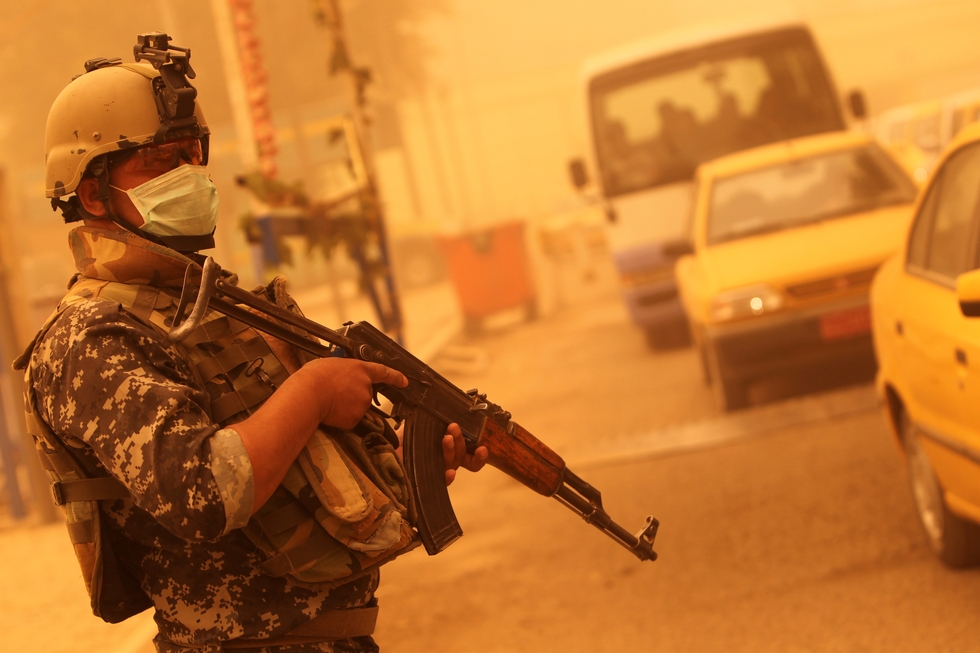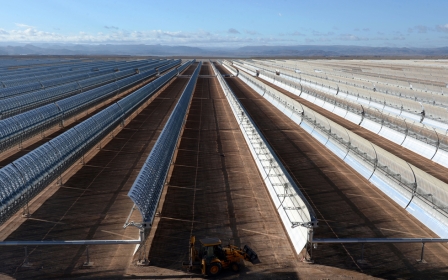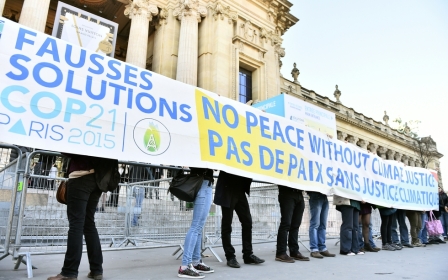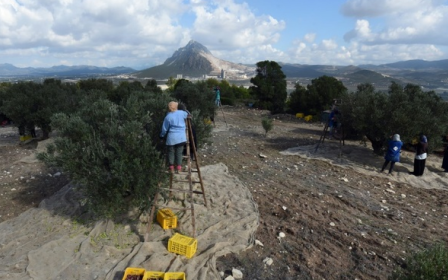Climate change and the dirty business of war

Let’s say you decide to host an international conference with the stated aim of curbing the phenomenon of rain in the world - but without taking into account the existence and behavioural patterns of clouds. Many observers would probably accuse you of willful oversight.
A very similar criticism can be applied to the widely applauded Paris Climate Conference (COP21), held in December 2015. We’ll get to the reasons in a minute.
Touted by Britain’s Guardian newspaper as “the world’s greatest diplomatic success,” the Paris conference produced an unprecedented agreement between 195 countries to reduce greenhouse gas emissions in the interest of staunching climate change.
An official press release from the United Nations Framework Convention on Climate Change noted that “[t]o reach these ambitious and important goals, appropriate financial flows will be put in place, thus making stronger action by developing countries and the most vulnerable possible”.
And indeed, pledges from the developing world came pouring in, many from the Middle East and North Africa. Tunisia, for example, has aimed to “reduce its carbon intensity by 41 percent compared to 2010,” with 13 percent of that pledge unconditional and 28 percent depending on foreign financial assistance.
Iran has tentatively pledged an eight percent unconditional and four percent conditional reduction of emissions - with the removal of relevant sanctions and other obstacles constituting obvious additional conditions.
Lebanon has committed unconditionally to a 15 percent reduction, with another 15 percent conditional upon assistance, although the Lebanese government’s notorious corruption and inability to perform simple tasks like collecting the garbage would seem to indicate there’s no need for premature pats on the back in the climate change arena.
The state of Israel, meanwhile, intends by 2030 “to achieve an economy-wide unconditional target of reducing its per capita greenhouse gas emissions” to 26 percent of the 2005 level.
Israel, of course, already tends to consider itself a fairly environmentally friendly oasis and has been encouraged in this perception by various international entities; in 2014, Yale University’s Environmental Performance Index awarded the country 39th place out of a total of 178. What this ranking failed to take into consideration, however, was the fact that Israel has for years been exporting its environmental problems to the occupied Palestinian territories.
Beyond dumping solid - and often hazardous - waste in the West Bank in order to skimp on prices, Israel also follows a policy according to which Israeli businesses that operate factories on occupied land are gifted with tax reductions and are furthermore not legally obligated to abide by the environmental and labour restrictions in place in Israel proper. Naturally, the pollution emitted by these factories has had detrimental effects on the health and livelihoods of Palestinians.
But occupation is apparently outside the scope of global climate deals. So, too, is the issue of perpetual war in the region - the devastating environmental repercussions of which will inevitably offset whatever advances are made in terms of emissions reductions. Hence the aforementioned rain-stopping analogy.
War's massive carbon footprint
It doesn’t take a rocket scientist to determine that war is bad for the atmosphere. The large-scale manufacturing of weapons, their exportation across the world, and the fuel burned by warplanes, tanks, and other combat vehicles are far from a drop in the pollution bucket; this is not to mention the damage done to water supplies and ecosystems by munitions and leaked oil.
Thus, even if the Middle East and environs were to be magically and spontaneously rendered 100-percent free of non-war-related emissions, the regional population still wouldn’t find much room to breathe.
Rampant militarisation and ongoing conflicts from Syria to Yemen will continue to take their toll on the environment as well as on human bodies, while Israel’s seemingly institutionalised commitment to high-tech bellicosity in the form of fighter jets and drones portends an ever-increasing climatic fallout.
To be sure, many a contaminating contribution has come from further afield, with the United States playing a starring role in that regard. Back in 2009, Naomi Klein drew attention to a report by Steve Kretzmann - the director of Oil Change International - on his organisation’s investigation into the atmospheric effects of the US war machine.
Noting that only very conservative emissions estimates were used, Kretzmann wrote that the Iraq war alone “was responsible for at least 141 million metric tons of carbon dioxide equivalent (MMTCO2e) from March 2003 through December 2007. To put that into perspective, if the US military operations in Iraq were ranked as a country in terms of emissions, it would emit more CO2 each year than 139 of the world’s nations do annually”.
It sort of endows the term “dirty war” with a whole new meaning.
Now consider a dispatch from that same year on the US Defence Department’s “role in global catastrophe,” authored by Sara Flounders and chosen by the popular media watchdog group Project Censored as one of its 25 “most censored” stories of 2009-10.
In her piece, Flounders pointed out that while the Pentagon happened to be “the largest institutional user of petroleum products and energy in general… [it] has a blanket exemption in all international climate agreements”.
One of the simplest reasons for this is that war is a more lucrative business than environmentalism. And while the Paris agreement purports to “combat climate change,” such a goal is categorically unattainable while “combat” is still part of the equation.
- Marwan El Solh is an environmental consultant based in Beirut.
The views expressed in this article belong to the author and do not necessarily reflect the editorial policy of Middle East Eye.
Photo: An Iraqi policeman wears a protective surgical mask as he mans a checkpoint during a heavy dust storm in Baghdad on 22 May, 2012 (AFP).
New MEE newsletter: Jerusalem Dispatch
Sign up to get the latest insights and analysis on Israel-Palestine, alongside Turkey Unpacked and other MEE newsletters
Middle East Eye delivers independent and unrivalled coverage and analysis of the Middle East, North Africa and beyond. To learn more about republishing this content and the associated fees, please fill out this form. More about MEE can be found here.





